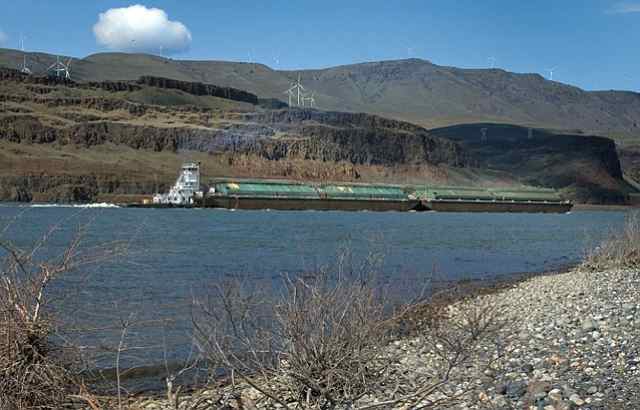forum
library
tutorial
contact

Advocate for Snake River Dams says
Removal Would Hurt Farmers
by Thomas Clouse
Spokesman-Review, February 21, 2021
|
the film forum library tutorial contact |

|
Advocate for Snake River Dams says
by Thomas Clouse
|
Barge access on the Columbia River as a cheap way to move tons of wheat
and give them a bargaining chip in negotiating prices with major railroads
 Two weeks after a U.S. representative from Idaho put forth a plan to remove four lower Snake River dams, a presenter for the Spokane Ag Expo and Farm Forum provided a virtual presentation about why her organization thinks breaching the dams would be a bad idea for Washington farmers.
Two weeks after a U.S. representative from Idaho put forth a plan to remove four lower Snake River dams, a presenter for the Spokane Ag Expo and Farm Forum provided a virtual presentation about why her organization thinks breaching the dams would be a bad idea for Washington farmers.
Kristin Meira, the executive director of the Pacific Northwest Waterways Association, was one of many presenters during the Ag Expo, which went online this year because of the coronavirus pandemic. Her presentation on YouTube was made available Wednesday.
In her prerecorded message, Meira suggested that ocean conditions, not the dams, are contributing to the declining salmon runs of the Northwest. She said studies show that salmon survival rates may be greater now than if no dams existed.
"I always like to remind folks of the life cycle of fish," Meira said. "They do spend most of their lives in the ocean. We are learning a whole lot more about ocean conditions these days from NOAA fisheries. West Coast wild salmon and steelhead runs are struggling, and the common denominator is the ocean."
Farmers, especially grain producers, have long advocated for barge access on the Columbia River as a cheap way to move tons of wheat and give them a bargaining chip in negotiating prices with major railroads.
Meira said barges hauled about 8.3 million tons of freight total 2018, including 3.9 million tons of grain down the Snake and Columbia rivers that otherwise would have to go on semitrucks or trains.
"Barging is just a low-human-interaction way to move this cargo safely and efficiently," she said.
Glen Squires, CEO of the Washington Grain Commission, said in an interview Thursday about 60% of the wheat grown in Washington is shipped west by barge on the river.
"Having more than one transportation source keeps rates competitive," Squires said. "Just ask the guys in Montana who only have one railroad."
The lower Snake River dams represent four of the eight dams in the Columbia River system that were built with navigation locks that allow barges to move freight all the way from Lewiston to shipping ports in the Portland area.
While the Ice Harbor, Lower Monumental, Little Goose and Lower Granite dams all have fish ladders that allow adult salmon to pass, the Environmental Protection Agency in 2020 confirmed what salmon advocates have been arguing for years: The dams cause water temperatures to increase, which makes it difficult for salmon and steelhead to survive.
Temperature spikes in 2015 were blamed for killing thousands of adult sockeye salmon trying to migrate back to Idaho that year.
Following that 2015 heat event, a coalition of river preservation groups including Columbia Riverkeeper, Snake River Waterkeeper and Idaho Rivers United went to court to force the EPA to finish writing the report that had been stalled for nearly two decades.
Released last year, the EPA report confirmed the four lower Snake River dams play the largest role in increasing water temperatures.
"We are pleased that it's done and identifies the hot water problems on the Columbia and Snake rivers," Brett VandenHeuvel, executive director of Columbia Riverkeeper, told the Associated Press last year.
In her presentation, Meira did not mention the elevated water temperatures. But she highlighted the economic benefits from power generation and commerce transport the dams make possible.
"We also like to remind folks that these dams do not block fish," she said. "Some of the numbers we are achieving with regard to fish passage survival, it rivals what is documented on undammed rivers. That gives you a sense of how well we are doing in being stewards for these fish and protecting them every step of the way as they move and make their journey on the river."
She acknowledged that the dams remain controversial and that some, including Idaho Rep. Mike Simpson earlier this month, have called for breaching them.
"There are some folks who have some pretty interesting ideas for our region," Meira said. "They make it sound so easy. But, I hope I left you with the idea that it's not that simple and there are a lot of other things taking place that are impacting our fish."
Related Pages:
If Snake River Dams are Breached, What Would Happen? We Must Get Our Message Out by Editorial Board, Tri-City Herald, 12/14/18
learn more on topics covered in the film
see the video
read the script
learn the songs
discussion forum
